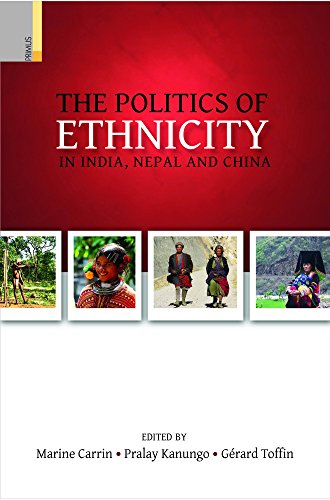The indigenous population, with their rich culture and heritage, represent an important component of Indian and Himalayan civilizations. Politics of Ethnicity in India, Neapal and China reviews the social, cultural and political processes that have shaped these indigenous societies in India, Nepal and China in recent years. The ethnic minorities, legally recognized in India and Nepal have emerged as powerful groups influencing the political imagery in both these countries. In Nepal, the staggering diversity of the Himalayan population poses a problem for the authorities. They include economically and culturally diverse groups, spread throughout the region. The state, partially inspired by India is now looking at institutionalizing procedures to integrate the indigenous people as citizens. In India, the threat of ethnic conflict has driven the Indian state to recognize new states and form autonomous district councils, paving way for an asymmetrical federalism where federal units are being devolved special powers. The acknowledgement of indigenous languages and scripts by the Constitution of India has offered the possibility for janjatis/adivasis to assert themselves. Likewise, the recent policies in favour of ethnic minority groups and their culture in Nepal have generated various initiatives from local communities to develop their often endangered culture. Both in India and Nepal, these changes impact the discourse held by leaders who are now claiming a history and culture for their own group. The construction of an identity through narratives, village theatre and other cultural expressions have become part of the subtle process of reinventing tradition. The Politics of Ethnicity in India, Nepal and China analyzes the reshaping of ethnic boundaries through acculturation, conversion, education, and religious movements, in times of conflict as well as in times of peace, highlighting how the indigenous people of India and Nepal frame a new sense of identity informed by 'reinvented' custom. This may offer a way to conciliate self-governance and democracy. In India, development programmes launched in different regions by the states have led to further deprivation of indigenous people and conflicts over environmental issues. This volume enables the reader to grasp the reformulation of identities influenced by cultural strategies of empowerment. As mentioned earlier, in both India and Nepal, the tribal has been considered a political agent in the national imagination. Besides, it is not by chance that current concern over biodiversity in a globalizing world has in many ways laid hope in tribal practices which are regarded as sustainable. Yet biodiversity also comes with the promise of a different lifestyle contrasting with the homogenized consumerism which dominates today's capitalist economy. Adivasi/janajati societies have often developed a policy of resisting global, capital, savage and corrupt industrial exploitation. For instance, they maintain 'sacred groves' as religious emblems of indigenous knowledge in central India and in the Khasi and Garo hills. This volume also discusses the progressive discovery of tribal art and its present status in the national context. It traces the story of how these art forms came to be recognized as such, underlining factors such as state patronage, which played an important role in this process. Retracing the path these artefacts took from local workshops to craft-exhibitions, museums and shops in the capital of Orissa State and on to those of the Indian Union capital city (New Delhi).
"synopsis" may belong to another edition of this title.


